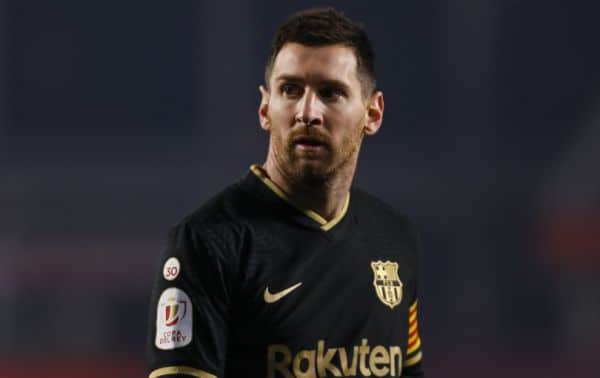Barcelona have been hit by Covid-19 and big-money flops – but how much of a financial impact does it have to make Lionel Messi the best-paid player in the world?
Sergio Aguero is a Barcelona player. At the same time, however, he is not. So, too, are Memphis Depay and Eric Garcia. They are recruited but not registered, ineligible at the moment.
It puts them in particularly good company. Barca cannot reregister Lionel Messi, either. Their captain’s new five-year contract is agreed. It includes the sacrifice of a huge pay cut, of 50% of his wages, albeit with a deal apparently structured so his salary increases again and so he could be pottering around their forward line, providing quality but precious little pressing, up until his 39th birthday.
But Barcelona require savings of around €200 million to comply with LaLiga’s salary cap. It is partly about amortisation and they are trying to swap the big earner, and big-money buy, Antoine Griezmann for Saul Niguez. They have disposed of a series of fringe players, but selling Junior Firpo to Leeds or loaning Francisco Trincao to Wolves only makes a small dent in the target: the supporting cast were paid a fraction of the sums the superstars commanded. Finding a taker for Martin Braithwaite won’t actually make much of a difference.
Barcelona’s fiscal crisis and their debts of £1.1bn are often traced to a series of signings, examples of overpaying, often to ludicrous extents, for Philippe Coutinho, Ousmane Dembele, Griezmann and Miralem Pjanic, who, even if the Bosnian’s arrival was more of an accounting trick, account for over £400m in outlay, have been paid considerable wages and have achieved far too little on the pitch.
But there is a very different factor: of the player who has been too good and too successful for their accounts to keep up. Barcelona’s financial hole can be attributed in part to Messi. His previous deal was apparently worth €138m a year. Put Messi in the Premier League’s 2019-20 wage-bill chart and he would fall between Aston Villa and West Ham; it is easy to say he offers better value for money than either did when they came 17th and 16th, respectively. It is uncontroversial to argue he brings more entertainment.
None of which actually renders him affordable. Barcelona’s plight suggests he is not. There is a valid question as to what is the market value for the man many regard as the greatest player ever (or, at the least, the greatest club player); perhaps, given the level Messi has reached, he merits being paid about 10 times as much as many other footballers most of us would deem world class. But putting a price on greatness is no easy task.
The lack of equivalents may render it harder to ascertain Messi’s rightful rate: whereas the mere mortals can be judged against each other to work out what they are worth, Cristiano Ronaldo may be the only pertinent comparison and his Juventus wage is apparently less than half of Messi’s, meaning the latter’s cut will still leave him as much the world’s best-paid player.
It helps explain the lack of takers even when the Argentinian is still technically available on a free transfer: even those with supposedly unlimited funds, like Paris Saint-Germain, Manchester City and Chelsea, did not test that principle by adding Messi to the wage bill.
Barcelona may have been trapped by Messi’s brilliance: they could not countenance letting a product of La Masia, a man who defined their greatest team and their biggest selling point and advertising tool, leave. Yet, it is apparent that they ended up paying far too much. They should wonder how they were held to ransom to such an extent by an agent who is not Jorge Mendes or Kia Joorabchian, but their No 10’s father.
Messi Jnr, who was unhappy when Barcelona ushered the well-paid Luis Suarez out last summer, perhaps ought to have realised sooner that, sooner or later, the colossal amounts he earned had to have a knock-on effect on others’ salaries. Now, with other senior figures encouraged, and perhaps needed, to take pay cuts, they do. Some may have to be sacrificed, sold to let Barcelona back inside the wage ceilings, but a policy of overpaying is a reason why Coutinho attracts so few offers.
Covid-19 and 15 months of an empty Camp Nou amplified Barcelona’s money troubles. But Messi feels their financial and footballing Faustian pact. Now they are paying for their glory years, for the price they committed to their finest-ever player, as they wait to see if they are allowed to even put him on the squad list for this season.





